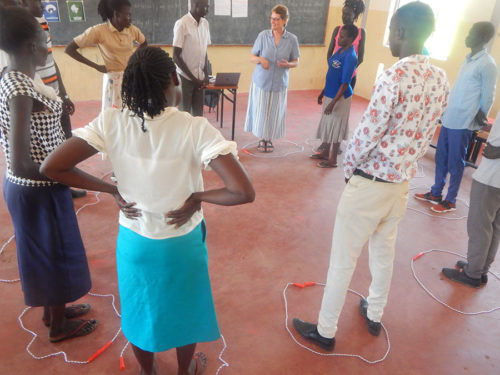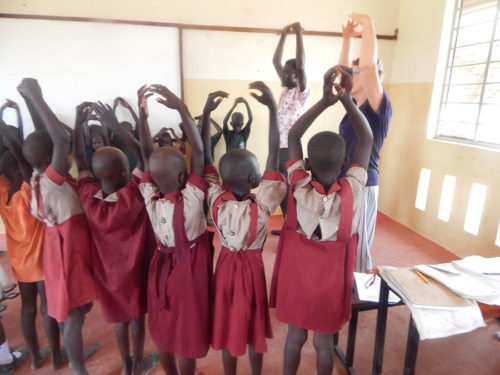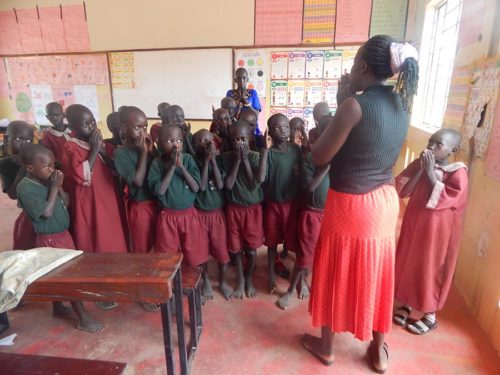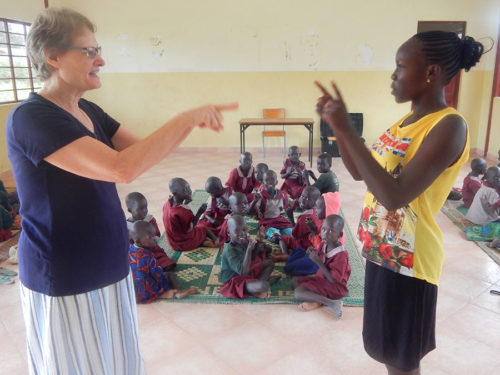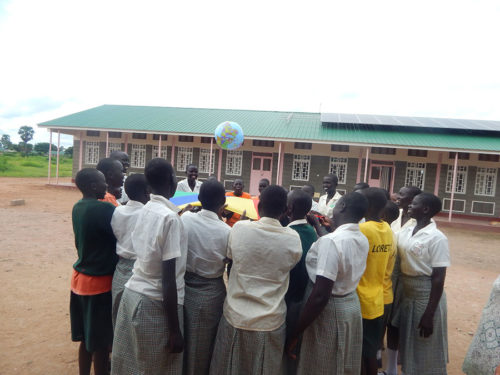News from Rumbek
Promoting Peace in Young Learners through Play
Play is an essential tool for learning and instilling good values in children. Children have a short concentration span and play is vital in reviving their energy. It also helps them to develop new skills and encourages their imagination and creativity.
Play creates an opportunity for children with different backgrounds to come together and develop social skills. Skills to handle children during play, with lots of care and compassion are necessary for teachers.
To achieve these objectives when dealing with our lower primary pupils in Loreto Rumbek, primary teachers and student teachers who teach lessons in these classes attended ‘Peaceful Play Workshops’ in July 2019. The workshops were facilitated by an experienced early childhood educator and curriculum developer, Mrs. Phyilis Horst Nofziger, and were supported by MCC.
Mrs. Phyilis explained, “This training is meant to help us teachers get learners’ attention by having background information on the working of the brain to help understand kids’ emotions. Peaceful play will help teach ways to refresh and encourage a calm and peaceful environment.”
On 19th and 20th July 2019, eleven lower primary school teachers attended an extensive training session on peaceful play. The teachers learnt about solving problems in a non-judgmental way using the ABCDE approach. The process entails Asking what the problem is, Brainstorming solutions, Choosing the best solutions, Doing it and Evaluating if the solution worked.
Teachers were also encouraged to use important executive skills when handling students. These skills entail catching learners’ attention, organization, prioritization, flexibility, empathy, and emotional control, among others.
Another aspect taught in this workshop was the ‘I Care’ rules. One of the Primary 1 teachers, Mr. James Maker described the experience, “I really like the use of caring language. Using polite words like sorry, please, excuse me will help learners to be friendly and create a conducive learning and playing environment for all learners. They will also learn to solve conflicts in a nonviolent way and learn the importance of peace at a tender age. The puppets and other tools we used in this workshop will help the learners understand better by demonstration.”
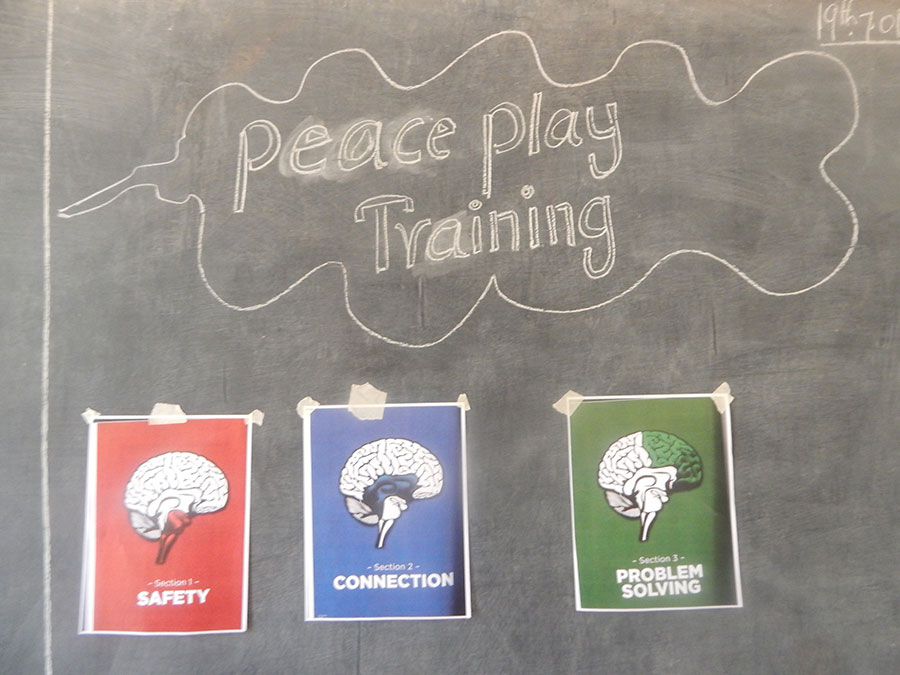
Teachers also learnt about musical deadlines, and breathing and grounding exercises. With help from the facilitator, teachers participated in short demonstrations of the ‘I care’ rules and the exercises to help them understand these concepts better.
On 21st and 22nd July 2019, Mrs. Phyillis facilitated training sessions with the Senior 2 and 3 student teachers respectively. In her opening remarks, she asked student teachers what they loved most about and what motivated them in teaching young pupils. Monica Yier, one student teacher replied, “The children listen to us. They are good to have around as they tell us stories and help us relief stress.”
Another student teacher, Alim Garang, added, “I love children because they remind me of my childhood moments at Kindergarten”. Other student teachers noted that it helps them to gain skills for working with children.
During the workshop, student teachers learnt the “I Care” rules. These five principles are used to govern them in conducting peaceful play and generally in dealing with children.
Rule No. 1: We are responsible for what we say and do. “We learnt that thinking before taking any action will stop us from hurting others. Our actions towards others determine their reaction and attitude towards us,” explained Elizabeth Piath of Senior 2B.
Rule No. 2: Listening to each other and emphasizing by repetition. The facilitator explained vividly by use of a game, “Whisper down the line”. From this game, student teachers learnt that information can be distorted when whispered from one person to another. Rather, one is supposed to say the message loudly and repeat for the audience to understand.
Rule No 3: Use of caring language. The students used puppets to dramatize this concept. “For instance, the monkey and the elephant engaged in a disagreement. The elephant was rude but in return, the monkey calmly helps the elephant understand that they should co-exist peacefully. Monkey notes that even though he is a small animal, he can climb trees and feed the elephant. This made the elephant change his approach and made peace with monkey,” explained Martha Acingath of Senior 2B.
Rule No 4: Caring for each other’s feelings. This involves approaching children when they are hurt and using good words help them cheer up. For instance, helping a child to explain feelings like anger or fear and finding a way of helping him/her brings about a happy environment. “The facilitator used an example illustrating animals taking meals in a queue. The elephant pushed tiger who fell down and pours his food. Tiger pleaded but elephant was arrogant. Tiger was fed up and wanted to leave the scene, but elephant calmed down and shared his food with tiger, “ explained Mary Kuei of Senior 2M.
Rule No 5: Hands are for helping not hurting. The facilitator threw a ball and all members demonstrated the aspect of teamwork by trying to keep the ball in the air.
Mrs. Phyillis also emphasized that Brain Breaks (BB) are essential activities in each and every lesson taught. This was followed by an exercise that used deep breaths to relax the mind and to reenergize.
After the BB session, Mrs. Phyillis instructed the student teachers to form groups of six or seven to dramatize the five “I care” rules. Of great importance was the use of actions only without using words. Although this was very challenging, most groups succeeded and they did a wonderful job acting out the rules of their choice.
The workshops were concluded with an interrogative session where the facilitator rewarded the student teachers with pencils. As most of the students answered the question, “What will you teach the pupils every Wednesday or Thursday morning besides the academic schedule?,” they spoke of hope and confidence in their ability to handle the young pupils. Some said they would teach children to express their feelings to a friend or a teacher and they would also name the various feelings being experienced.
To follow-up, Mrs. Phyilis met the student teachers on Wednesday and Thursday to observe their teaching, and noted that they were applying the concepts. She has also helped the lower primary teachers to demonstrate some of the areas she taught, in their classes, using the tools she provided so that the teachers would use them with ease in her absence. The primary teachers are applying these skills already.
According to Ms. Christine Ocokoru, “We danced to the music and everyone freezes at the position they are at the moment when the music stops. These activities are so good and we are teaching the learners in their free and resting time. They are active in learning the new skills which are essential in increasing learners’ attention.”
Mrs. Phyilis was impressed by the teachers’ reception and willingness to learn. She stated, “Thanks to the teachers for being open to ask and learn more. I’m impressed.”
The primary teachers were awarded with certificates for this training. We hope these skills will help in creating a peaceful school environment for our students and improve their social and mental wellbeing.
Sign up to our newsletter
Keep up to date with news, fundraising events and activities
Want to help us further? Make a Donation

